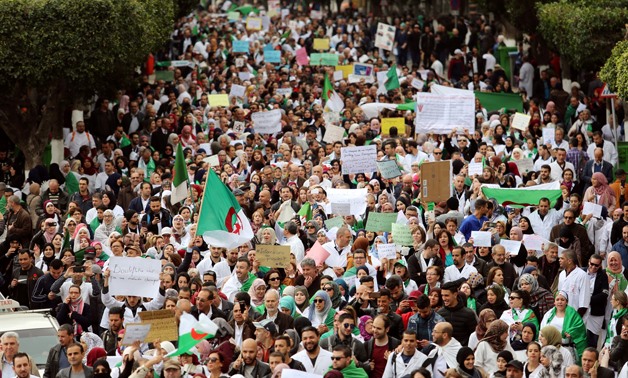
FILE PHOTO: Health workers carry national flags and banners as they march during a protest calling on President Abdelaziz Bouteflika to quit, in Algiers, Algeria March 19, 2019. REUTERS/Ramzi Boudina/File Photo
ALGIERS/CAIRO - 21 March 2019: Protests that brought hundreds of thousands onto the streets in Algeria over the past month led President Abdelaziz Bouteflika to scrap plans to run for a fifth term.
He postponed an election originally set for April and announced that experts would oversee a transition to a "new system" in coming months. Protesters say this is not enough.
WHAT CAUSED THE PROTESTS?
The immediate cause was Bouteflika's candidacy. Calls for protests spread after it was confirmed on Feb. 10. Mass rallies began on Feb. 22, and numbers rose over the following two Fridays. After Bouteflika abandoned plans to stand but stopped short of stepping down -- raising the prospect that he would stay in power for the rest of the year -- the protests swelled.
More broadly, protests drew on frustration among millions of Algerians who feel politically and economically excluded, and resentment against an ageing and secretive elite that has controlled Algeria since independence from France in 1962.
President since 1999, Bouteflika became a symbol of an independence generation that clung to power. He oversaw a return to stability after a civil war in the 1990s but in his second decade in power was incapacitated and mostly absent from public life, fuelling a sense of drift and decline.
Plans to diversify the economy away from oil stalled in a sclerotic system many saw as corrupt and riven with cronyism.
HOW DID BOUTEFLIKA SURVIVE SO LONG?
Major Islamist groups were discredited by the 1990s war and along with a liberal opposition were coopted or excluded when it ended. As the ruling National Liberation Front (FLN) reasserted itself, political apathy set in and election turnouts dropped.
When uprisings swept the region in 2011, Algeria used a heavy security and oil money to curtail demonstrations.
There were frequent local protests, but these demanded state resources, not political change. Factional battles played out in the domestic media, relatively free by regional standards. Then, as now, neither ruling elite factions nor Bouteflika and his entourage appeared able to agree on a succession plan.
WHO HAS BEEN RUNNING THE COUNTRY?
Bouteflika has rarely been seen in public since suffering a stroke in 2013, but by then he had already sidelined or outlived the generals who brought him to power. General Mohamed "Toufik" Mediene, head of military intelligence and the man widely seen to be the real centre of power in Algeria, departed in 2015.
While the army remained Algeria's most powerful institution, an informal clique around the presidency amassed more influence, including Bouteflika's younger brother Said. An emerging business elite profiting from surging oil income also benefited.
WHAT ARE THE POSSIBLE SCENARIOS NOW?
Bouteflika announced that an "independent and inclusive" national conference would draft and new constitution and set a date for elections, and should conclude its work by the end of the year. An interim, technocratic government is being formed.
But this plan has been cast into doubt as Bouteflika's position has weakened. Protesters want him to step down when his five-year term ends in April and say their goal is sustain pressure and prevent infiltration from "Bouteflika's system".
Chief of staff Gaed Salah has said the army should take responsibility for solving the crisis but so far it has been waiting in the wings. The army is more reluctant to intervene directly than in the past. Its decision to cancel parliamentary elections in 1992 that Islamists were poised to win triggered the conflict that left up to 200,000 people dead.
Islamism is in decline, and a new leader may come from the political mainstream. Ahmed Benbitour, a former prime minister, and Mustapha Bouchachi, a rights activist and lawyer, are among those emerging as protest leaders.
WHAT CHALLENGES DO PROTESTERS FACE?
Protesters are trying to remain peaceful. From the start, they have worried that factions within the security forces may provoke violence to discredit protesters, or that demonstrations could turn violent when protesters' demands are not met.
Another challenge is to find leaders with enough experience and broad support -- those who served under Bouteflika may be discredited in the eyes of protesters.
Protesters fear that factions holding power and associated patronage networks will look to survive even as they abandon Bouteflika. Most observers believe that while Bouteflika and his clique will leave power, the system around them will remain.
WHAT'S AT STAKE?
Algeria is Africa's biggest country by landmass and has a population of more than 40 million. It is a major oil and gas producer and OPEC member, and a top supplier of gas to Europe.
Western states see Algeria as a counter-terrorism partner. It is a significant military player in North Africa and the Sahel, and diplomatically involved in crises in Mali and Libya.
Algeria also backs the Polisario Front independence movement in Western Sahara, in opposition to its neighbour Morocco.


Comments
Leave a Comment